2016-2017学年新译林小学英语六年级英语上下册重点词汇、句型、语法知识归纳整理【精品推荐】
- 格式:docx
- 大小:73.80 KB
- 文档页数:36
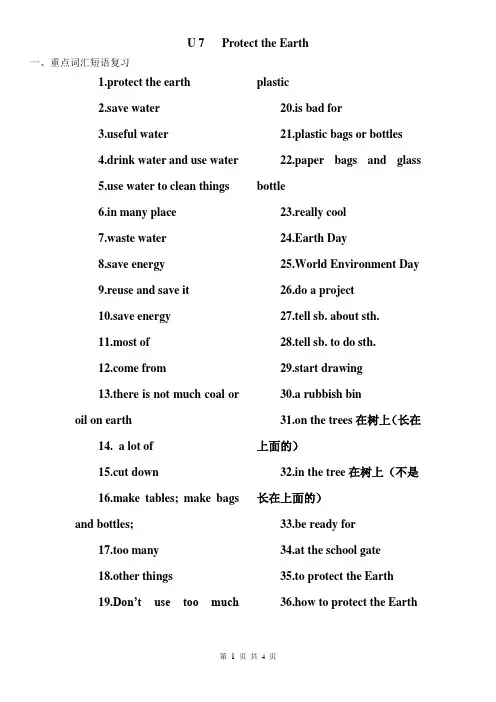
U 7 Protect the Earth 一、重点词汇短语复习1.protect the earth2.save watereful water4.drink water and use watere water to clean things6.in many place7.waste water8.save energy9.reuse and save it10.save energy11.most ofe from13.there is not much coal or oil on earth14. a lot of15.cut down16.make tables; make bags and bottles;17.too many18.other things19.Don’t use too much plastic20.is bad for21.plastic bags or bottles22.paper bags and glass bottle23.really cool24.Earth Day25.World Environment Day26.do a project27.tell sb. about sth.28.tell sb. to do sth.29.start drawing30.a rubbish bin31.on the trees在树上(长在上面的)32.in the tree在树上(不是长在上面的)33.be ready for34.at the school gate35.to protect the Earth36.how to protect the Earth二、单元语法1.We use water to clean things.We use wood to make tables,chairs and other things.“use...to”表示用...做...。
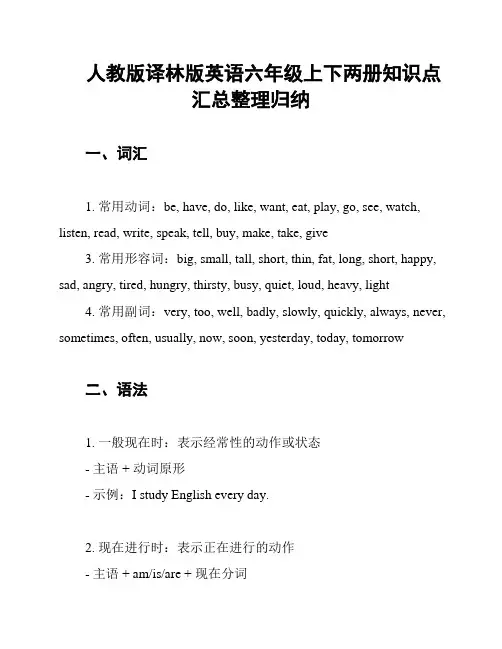
人教版译林版英语六年级上下两册知识点汇总整理归纳一、词汇1. 常用动词:be, have, do, like, want, eat, play, go, see, watch, listen, read, write, speak, tell, buy, make, take, give3. 常用形容词:big, small, tall, short, thin, fat, long, short, happy, sad, angry, tired, hungry, thirsty, busy, quiet, loud, heavy, light4. 常用副词:very, too, well, badly, slowly, quickly, always, never, sometimes, often, usually, now, soon, yesterday, today, tomorrow二、语法1. 一般现在时:表示经常性的动作或状态- 主语 + 动词原形- 示例:I study English every day.2. 现在进行时:表示正在进行的动作- 主语 + am/is/are + 现在分词- 示例:He is playing football now.3. 一般过去时:表示过去的动作或状态- 主语 + 动词过去式- 示例:They went to the park yesterday.4. 一般将来时:表示将来的动作或状态- 主语 + will + 动词原形- 示例:I will visit my grandparents next week.5. 祈使句:表示命令、请求、建议- 动词原形 + 其他- 示例:Please close the door.6. 形容词比较级:表示两个事物的比较- 主语 + be + 形容词比较级 + than + 其他- 示例:My sister is taller than me.7. 数词:表示数量- 示例:two apples, three books三、口语表达1. 问候语:Hello! Hi! Good morning! Good afternoon! Good evening!2. 自我介绍:My name is [name]. I am [age] years old.3. 询问年龄:How old are you?4. 询问姓名:What's your name?5. 询问感受:How are you? I'm fine/good/happy/sad.6. 道歉:Sorry.7. 感谢:Thank you. Thanks.8. 请求:Please + 动词原形.9. 邀请:Would you like + 动词原形?10. 表达喜欢:I like + 名词/动词-ing.11. 表达不喜欢:I don't like + 名词/动词-ing.12. 表达能力:I can + 动词原形.13. 询问价格:How much is it?14. 表达时间:What time is it?15. 表达日期:What's the date today?16. 询问天气:What's the weather like today?17. 表达喜怒:I'm happy/angry/sad.四、阅读理解1. 阅读短文,回答问题:根据短文内容选择正确的答案。
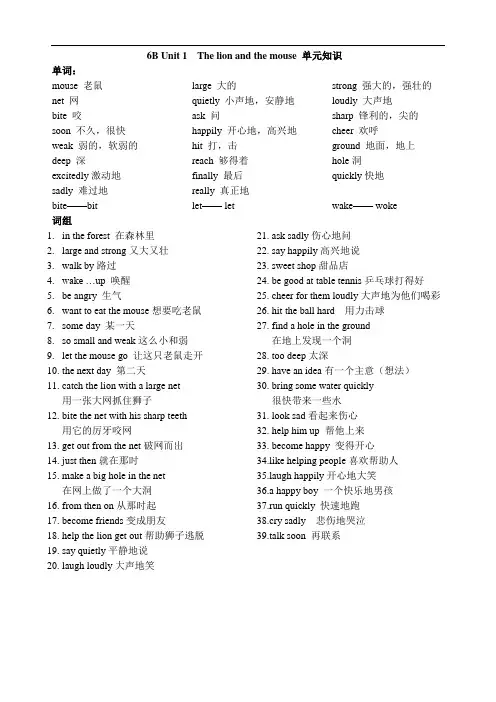
6B Unit 1 The lion and the mouse 单元知识单词:mouse 老鼠large 大的strong 强大的,强壮的net 网quietly 小声地,安静地loudly 大声地bite 咬ask 问sharp 锋利的,尖的soon 不久,很快happily 开心地,高兴地cheer 欢呼weak 弱的,软弱的hit 打,击ground 地面,地上deep 深reach 够得着hole洞excitedly激动地finally 最后quickly快地sadly 难过地really 真正地bite——bit let—— let wake—— woke词组1.in the forest 在森林里rge and strong又大又壮3.walk by路过4.wake …up 唤醒5.be angry 生气6.want to eat the mouse想要吃老鼠7.some day 某一天8.so small and weak这么小和弱9.let the mouse go 让这只老鼠走开10.the next day 第二天11.catch the lion with a large net用一张大网抓住狮子12.bite the net with his sharp teeth用它的厉牙咬网13.get out from the net破网而出14.just then就在那时15.make a big hole in the net在网上做了一个大洞16.from then on从那时起17.become friends变成朋友18.help the lion get out帮助狮子逃脱19.say quietly平静地说ugh loudly大声地笑21.ask sadly伤心地问22.say happily高兴地说23.sweet shop甜品店24.be good at table tennis乒乓球打得好25.cheer for them loudly大声地为他们喝彩26.hit the ball hard 用力击球27.find a hole in the ground在地上发现一个洞28.too deep太深29.have an idea有一个主意(想法)30.bring some water quickly很快带来一些水31.look sad看起来伤心32.help him up 帮他上来33.become happy 变得开心34.like helping people喜欢帮助人ugh happily开心地大笑36.a happy boy 一个快乐地男孩37.run quickly 快速地跑38.cry sadly 悲伤地哭泣39.talk soon 再联系句子1.The lion was angry and wanted to eat the mouse.这只狮子很生气想要吃那只老鼠。
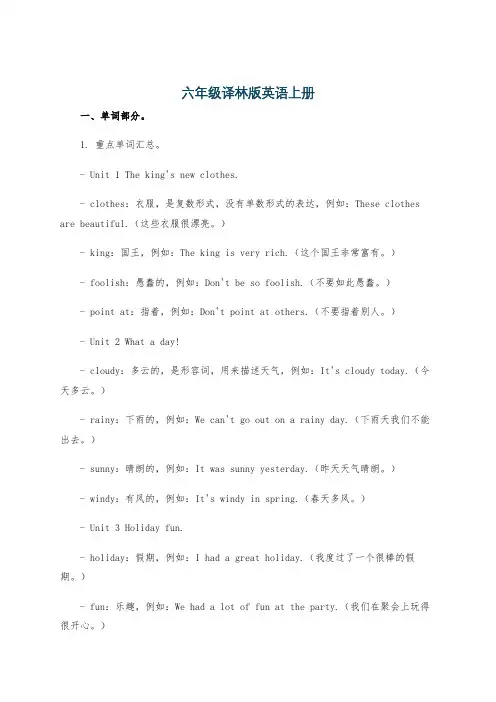
六年级译林版英语上册一、单词部分。
1. 重点单词汇总。
- Unit 1 The king's new clothes.- clothes:衣服,是复数形式,没有单数形式的表达,例如:These clothes are beautiful.(这些衣服很漂亮。
)- king:国王,例如:The king is very rich.(这个国王非常富有。
)- foolish:愚蠢的,例如:Don't be so foolish.(不要如此愚蠢。
)- point at:指着,例如:Don't point at others.(不要指着别人。
)- Unit 2 What a day!- cloudy:多云的,是形容词,用来描述天气,例如:It's cloudy today.(今天多云。
)- rainy:下雨的,例如:We can't go out on a rainy day.(下雨天我们不能出去。
)- sunny:晴朗的,例如:It was sunny yesterday.(昨天天气晴朗。
)- windy:有风的,例如:It's windy in spring.(春天多风。
)- Unit 3 Holiday fun.- holiday:假期,例如:I had a great holiday.(我度过了一个很棒的假期。
)- fun:乐趣,例如:We had a lot of fun at the party.(我们在聚会上玩得很开心。
)- visited(visit的过去式):参观,拜访,例如:I visited my grandparents last week.(我上周拜访了我的祖父母。
)- Unit 4 Then and now.- ago:以前,例如:I lived in a small village five years ago.(五年前我住在一个小村庄。
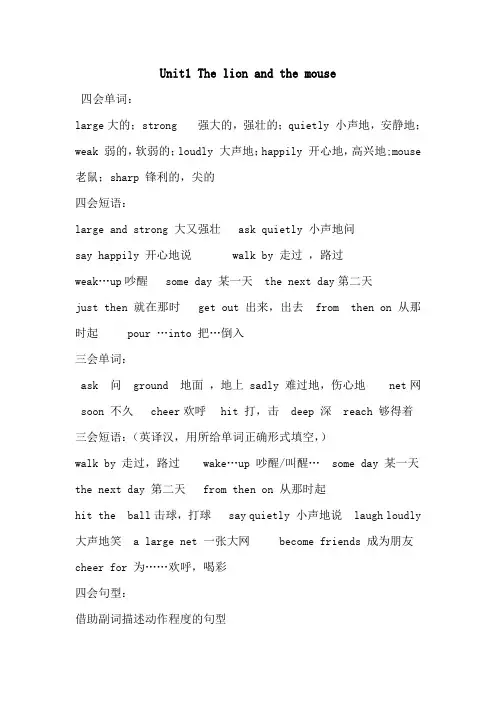
Unit1 The lion and the mouse四会单词:large大的;strong 强大的,强壮的;quietly 小声地,安静地;weak 弱的,软弱的;loudly 大声地;happily 开心地,高兴地;mouse 老鼠;sharp 锋利的,尖的四会短语:large and strong 大又强壮 ask quietly 小声地问say happily 开心地说 walk by 走过,路过weak…up吵醒 some day 某一天 the next day第二天just then就在那时 get out 出来,出去 from then on 从那时起 pour …into 把…倒入三会单词:ask 问 ground 地面,地上 sadly 难过地,伤心地 net网soon 不久 cheer欢呼 hit 打,击 deep 深 reach 够得着三会短语:(英译汉,用所给单词正确形式填空,)walk by 走过,路过 wake…up 吵醒/叫醒… some day 某一天the next day 第二天 from then on 从那时起hit the ball击球,打球 say quietly 小声地说 laugh loudly 大声地笑 a large net 一张大网 become friends 成为朋友cheer for 为……欢呼,喝彩四会句型:借助副词描述动作程度的句型For example:The lion asked sadly.狮子难过地问道。
The lion laughed loudly.狮子大声地笑道。
三会句型:(选择,搭配)1.表达让某人做某事的句型:He le1t the mouse go..他让老鼠走了。
2.引用某人语言的句型表达:“please don’t eat me. I can help you some day.”said the mouse quietly.“请不要吃我。
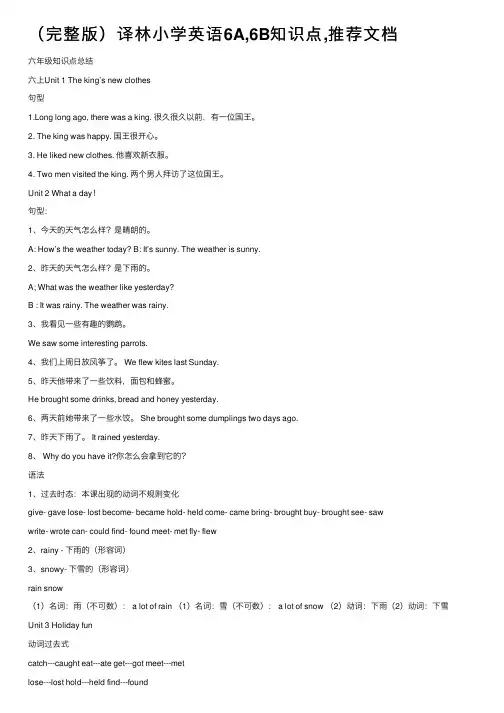
(完整版)译林⼩学英语6A,6B知识点,推荐⽂档六年级知识点总结六上Unit 1 The king’s new clothes句型1.Long long ago, there was a king. 很久很久以前,有⼀位国王。
2. The king was happy. 国王很开⼼。
3. He liked new clothes. 他喜欢新⾐服。
4. Two men visited the king. 两个男⼈拜访了这位国王。
Unit 2 What a day!句型:1、今天的天⽓怎么样?是晴朗的。
A: How’s the weather today? B: It’s sunny. The weather is sunny.2、昨天的天⽓怎么样?是下⾬的。
A; What was the weather like yesterday?B : It was rainy. The weather was rainy.3、我看见⼀些有趣的鹦鹉。
We saw some interesting parrots.4、我们上周⽇放风筝了。
We flew kites last Sunday.5、昨天他带来了⼀些饮料,⾯包和蜂蜜。
He brought some drinks, bread and honey yesterday.6、两天前她带来了⼀些⽔饺。
She brought some dumplings two days ago.7、昨天下⾬了。
It rained yesterday.8、 Why do you have it?你怎么会拿到它的?语法1、过去时态:本课出现的动词不规则变化give- gave lose- lost become- became hold- held come- came bring- brought buy- brought see- sawwrite- wrote can- could find- found meet- met fly- flew2、rainy - 下⾬的(形容词)3、snowy- 下雪的(形容词)rain snow(1)名词:⾬(不可数): a lot of rain (1)名词:雪(不可数): a lot of snow (2)动词:下⾬(2)动词:下雪Unit 3 Holiday fun动词过去式catch---caught eat---ate get---got meet---metlose---lost hold---held find---found重点句型:1. What did you do for the holiday?2. How was your holiday? It was great fun.3. Why did you call me?Because I wanted to give the fish to you.4. What great fun!5. It is time for dinner.Unit 4 then and now句型1. What day is today? = What day is it today? 今天星期⼏?What’s the date today?今天⼏⽉⼏号?(the 19th of September 九⽉⼗九号)2. Six years ago, Mike could read and draw, but he could not write.Now he can do many things.六年前麦克会阅读和画画,但是他不会写。
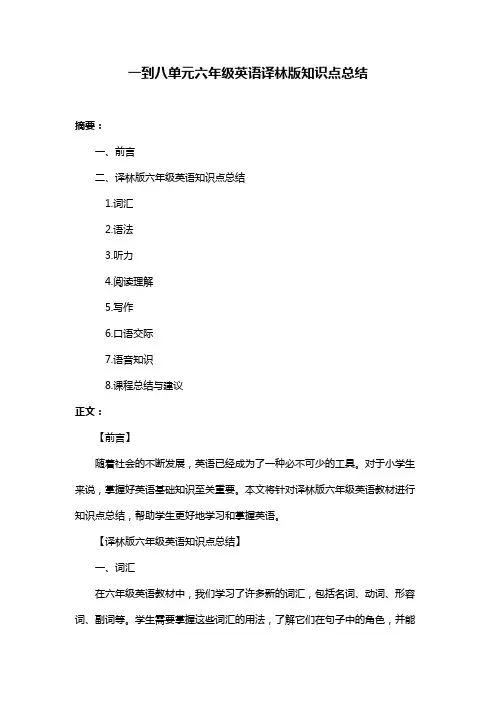
一到八单元六年级英语译林版知识点总结摘要:一、前言二、译林版六年级英语知识点总结1.词汇2.语法3.听力4.阅读理解5.写作6.口语交际7.语音知识8.课程总结与建议正文:【前言】随着社会的不断发展,英语已经成为了一种必不可少的工具。
对于小学生来说,掌握好英语基础知识至关重要。
本文将针对译林版六年级英语教材进行知识点总结,帮助学生更好地学习和掌握英语。
【译林版六年级英语知识点总结】一、词汇在六年级英语教材中,我们学习了许多新的词汇,包括名词、动词、形容词、副词等。
学生需要掌握这些词汇的用法,了解它们在句子中的角色,并能在实际情景中运用。
二、语法语法是英语学习的基础,译林版六年级英语教材涵盖了诸如时态、语态、主谓一致、疑问句和祈使句等语法知识。
学生需要理解这些语法规则,并在写作和口语中正确运用。
三、听力提高听力水平有助于学生更好地理解和掌握英语。
通过听力训练,学生可以锻炼自己的耳朵,提高对英语发音的敏感度,同时也能积累更多的词汇和表达。
四、阅读理解阅读理解是英语学习中非常重要的一部分。
在六年级教材中,我们选取了一些有趣的英语文章,帮助学生提高阅读速度,培养他们的阅读策略,并学会从文章中获取信息。
五、写作写作是英语学习的综合体现。
在六年级教材中,我们教授了一些基本的写作技巧,如如何组织段落、如何使用连词等,并鼓励学生进行创意写作,提高他们的写作水平。
六、口语交际口语交际是英语学习的关键环节。
在教材中,我们设计了许多情景对话,让学生在实际场景中练习英语,提高他们的口语表达能力。
七、语音知识译林版六年级英语教材还涵盖了语音知识,如音标、发音等。
学生需要掌握这些知识,以便更好地发音和拼写英语单词。
八、课程总结与建议通过对译林版六年级英语教材的知识点总结,学生可以更好地掌握英语基础知识,为今后的学习打下坚实的基础。
建议学生在学习过程中,注重词汇积累,加强语法训练,提高听说读写能力,并养成良好的学习习惯。
【结语】总之,译林版六年级英语教材涵盖了丰富的知识点,学生需要认真学习,努力掌握。
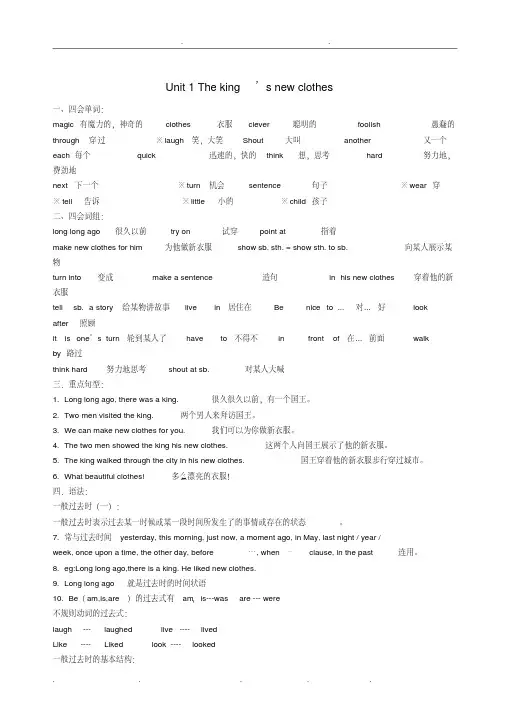
Unit 1 The king’s new clothes一、四会单词:magic 有魔力的,神奇的 clothes 衣服 clever 聪明的 foolish 愚蠢的through 穿过※laugh 笑,大笑 Shout 大叫 another 又一个each 每个 quick 迅速的,快的 think 想,思考 hard 努力地,费劲地next 下一个※turn 机会 sentence 句子※wear 穿※tell 告诉※little小的※child孩子二、四会词组:long long ago 很久以前 try on 试穿 point at 指着make new clothes for him 为他做新衣服 show sb. sth. = show sth. to sb. 向某人展示某物turn into 变成 make a sentence 造句in his new clothes 穿着他的新衣服tell sb. a story 给某物讲故事 live in 居住在 Be nice to ... 对...好 lookafter 照顾it is one’s turn 轮到某人了 have to 不得不 in front of 在...前面 walkby 路过think hard 努力地思考 shout at sb. 对某人大喊三.重点句型:1.Long long ago, there was a king. 很久很久以前,有一个国王。
2.Two men visited the king. 两个男人来拜访国王。
3.We can make new clothes for you. 我们可以为你做新衣服。
4.The two men showed the king his new clothes. 这两个人向国王展示了他的新衣服。
5.The king walked through the city in his new clothes. 国王穿着他的新衣服步行穿过城市。
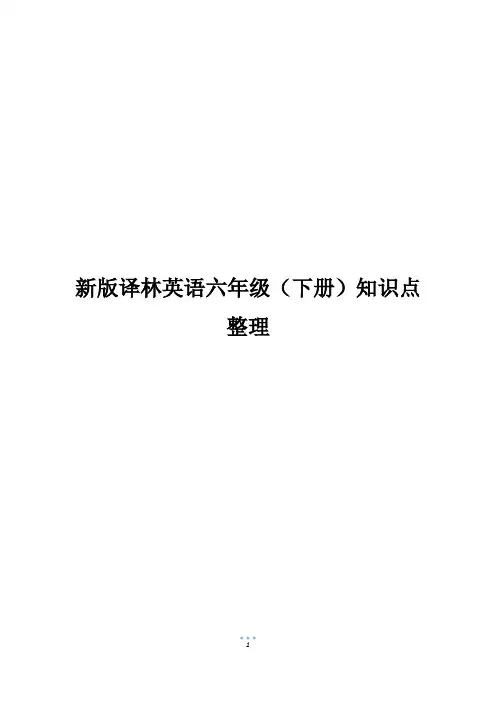
新版译林英语六年级(下册)知识点整理WORD格式可编辑2016年苏教译林版小学六年级英语下册单元知识汇总6B Unit 1 The lion and the mouse 知识汇总一、四会单词rge大的2. strong强壮的3. quietly安静地;小声地4. Weak虚弱的5. loudly大声地6. happily开心地;高兴地二、三会单词老鼠mouce 复数mice 走过,路过walk by 吵醒,叫醒wake …up 某一天same day 释放不能,放开let… go 第二天the next day网net 咬bite 锋利的,尖的sharp 难过地,伤心地sadly 就在那时just then 不久,很快soon 从那时起from then on 欢呼cheer 打,击hit 深的deep 够得着reach迅速地,快地quickly 把……倒入pour …into 三、短语积累狮子和老虎the lion and the mouse mouse: 复数mice 辨析mouth嘴巴month月份又大又强壮large and strong 又小又弱small and weak走过… walk by 走过森林walk by the forest 把狮子叫醒wake the lion up (代词宾格放中间) wake me up 我能在某一天帮助你I can help you some day 将来不确定的某一天Some day:安静地说say quietly quiet→quietly 大声地笑道laugh loudly loud→loudly 让狮子走let the mouse go let sb do 第二天the next day用一个大网抓住狮子catch the lion with a large net catch 过去式:caught 用他的锋利的牙齿咬网bite the net with his sharp teeth (tooth) bite过去式: bit 出来get out伤心地问道ask sadly sad→sadly 就在那个时候just then 在网里弄了个大洞make a big hole in the net专业技术知识共享WORD格式可编辑开心地说say happily happy→ha ppily 从那时起from then on成为好朋友become good friends become +形容词变得如何… 糖果店sweet shop 一个棒棒糖a lollipop他会说什么? what will he say? 没关系It doesn’t matter. 伊索寓言Aesop’s Fables一本中文成语书 a Chinese idiom book 开心地打乒乓play table tennis happily 擅长be good at+名词// be good at +动词ing大声地为他们欢呼cheer for them loudly cheer for为…欢呼击球用力hit the ball hard hit打,击(过去式: hit): 最后finally 近意: at last 太深too deep 我够不到I can’t reach it reach到达reach my school 迅速地拿一些水来bring some water quickly把它倒进洞里pour it in the hole 干得好! Well done 四、四会句子The mouce said quietly. 老鼠小声地说。
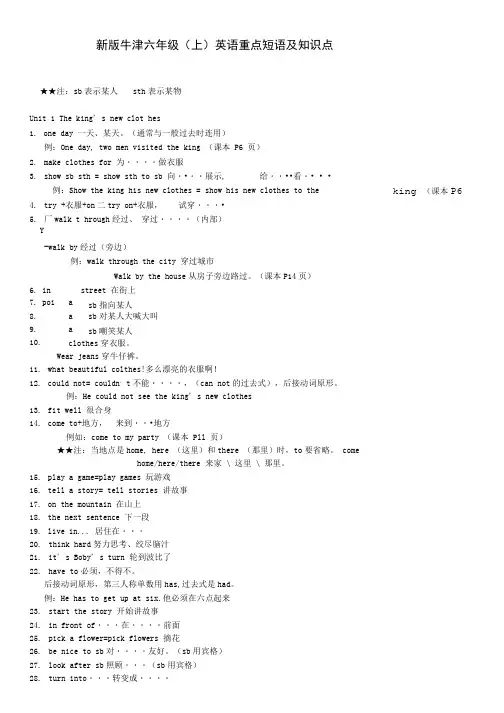
king (课本P6页)新版牛津六年级(上)英语重点短语及知识点★★注:sb 表示某人 sth 表示某物Unit 1 The king' s new clot hes1. one day 一天、某天。
(通常与一般过去时连用)例:One day, two men visited the king (课本 P6 页)2. make clothes for 为・・・・做衣服3. show sb sth = show sth to sb 向・•・・展示, 给・・••看・• • •例:Show the king his new clothes = show his new clothes to the4. try +衣服+on 二try on+衣服, 试穿・・・•5. 厂walk t hrough 经过、 穿过・・・・(内部)Y-walk by 经过(旁边)例:walk through the city 穿过城市Walk by the house 从房子旁边路过。
(课本P14页) 6. in the ; street 在街上7. poi nt a t sb 指向某人8. shout a t sb 对某人大喊大叫9. laugh a t sb 嘲笑某人10. wear clothes 穿衣服。
Wear jeans 穿牛仔裤。
11. what beautiful colthes!多么漂亮的衣服啊!12. could not= couldn , t 不能・・・・,(can not 的过去式),后接动词原形。
例:He could not see the king' s new clothes13. fit well 很合身14. come to+地方, 来到・・•地方例如:come to my party (课本 Pll 页)★★注:当地点是home, here (这里)和there (那里)时,to 要省略。
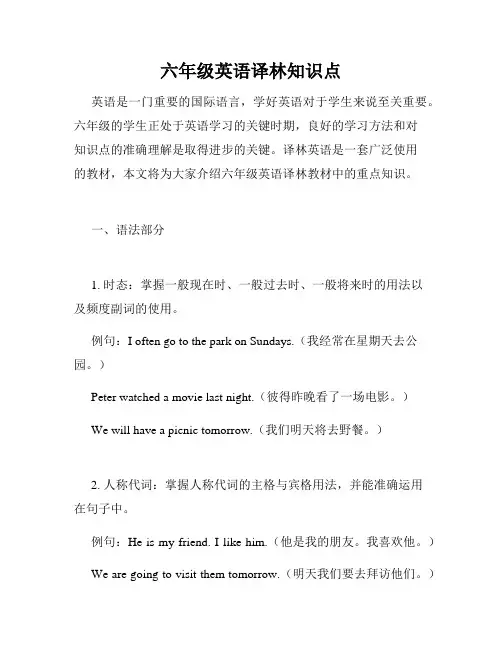
六年级英语译林知识点英语是一门重要的国际语言,学好英语对于学生来说至关重要。
六年级的学生正处于英语学习的关键时期,良好的学习方法和对知识点的准确理解是取得进步的关键。
译林英语是一套广泛使用的教材,本文将为大家介绍六年级英语译林教材中的重点知识。
一、语法部分1. 时态:掌握一般现在时、一般过去时、一般将来时的用法以及频度副词的使用。
例句:I often go to the park on Sundays.(我经常在星期天去公园。
)Peter watched a movie last night.(彼得昨晚看了一场电影。
)We will have a picnic tomorrow.(我们明天将去野餐。
)2. 人称代词:掌握人称代词的主格与宾格用法,并能准确运用在句子中。
例句:He is my friend. I like him.(他是我的朋友。
我喜欢他。
)We are going to visit them tomorrow.(明天我们要去拜访他们。
)3. 数词:掌握基数词与序数词的用法,能够准确表达数量。
例句:I have three pens.(我有三支笔。
)Today is the fourth of July.(今天是七月四日。
)4. 动词的-ing形式:理解动词的-ing形式表示进行时态,能够正确运用动词的-ing形式。
例句:He is swimming in the pool.(他正在游泳池里游泳。
)二、词汇部分1. 基本词汇:认读并能够正确拼写一些基础的英文单词,包括数字、颜色、家庭成员、动物等常用词汇。
例句:There are six cats in the room.(房间里有六只猫。
)2. 时尚词汇:了解一些流行的英语词汇,如食物、电子产品、音乐等方面的词汇。
例句:I like to listen to pop music.(我喜欢听流行音乐。
)三、阅读理解部分1. 短文阅读:能够阅读简短的英语文章,并理解文章的大意。
译林版小学六年级上册英语全册各单元短语、句型大全总结Unit 1 The king's new clothes一、核心短语the king's new clothes皇帝的新衣long long ago很久以前One day某一天visit the king拜访国王try on these clothes试穿这些衣服show the king his new clothes给国王看他的新衣these magic clothes这些神奇的衣服clever people 聪明的人foolish people愚蠢的人walk through the city走过这座城市in/ wear his new clothes 穿着他的新衣a little boy一个小男孩point at the king指着国王fit well非常合身tell a story讲故事each student每个学生the next sentence下一句think hard努力地想have to不得不in front of the house在房子前面;walk by the house步行经过房子shout at the old man对着老人大喊give me your child 把你的孩子给我be nice to her对她很好look after him照顾他turn into a prince变成王子二、重点句型1. My king, we can make new clothes for you.我的国王,我们可以给您做新衣服。
【解析】can为情态动词,后面跟动词原形;“make sth.for sb."意为“为某人制作某物",for为介词,后面如果跟人称代词需要用其宾格形式。
My mother can make dresses for me.我妈妈可以给我做连衣裙。
They are making a birthday cake for Su Hai.他们正在为苏海制作一个生日蛋糕。
六年级是英语学习过程中的一个重要阶段,也是学生掌握基础知识,
并进行更深入学习的时候。
下面是对译林英语六年级知识点的整理。
1.时态:六年级学生将进一步学习英语的各种时态,包括一般现在时、一般过去时、一般将来时、现在进行时等。
他们将学习如何正确地使用这
些时态来描述动作的发生和发展。
2.句型转换:学生将学习句子从一种形式转换成另一种形式,比如从
陈述句变成疑问句,从肯定句变成否定句等。
这有助于他们更好地理解和
掌握各种语法结构。
3.单词拼写:学生将继续学习并巩固他们的拼写能力。
他们将学会正
确拼写一些较复杂的单词,并注意规则和拼写规律。
4.语法:学生将学习和巩固各种语法知识,包括名词、动词、形容词、副词等的用法和变化规则。
他们将学习如何正确使用这些语法知识来构建
句子,并表达自己的意思。
6.写作:学生将继续提高他们的写作能力,包括写作短文和句子。
他
们将学会如何组织思路、选择适当的词汇和语法结构,并表达清晰和有逻
辑的思想。
7.听力:六年级学生将改善他们的听力技能,能够听懂并理解基本的
日常对话和广播材料。
他们将学会提取关键信息、获取细节并理解上下文。
8.口语表达:学生将学会更好地表达自己的意思,包括口头对话、介绍、询问和回答问题等。
他们将学会使用正确的语音、语调和语速来传达
自己的意思。
以上是对译林英语六年级知识点的一个简单整理。
这些知识点将帮助学生进一步掌握英语的基础知识,并提升他们的阅读、写作、听力和口语能力。
希望对学生们的英语学习有所帮助。
六年级上册英语教材译林版一、单词部分。
1. 重点单词汇总。
- Unit 1 The king's new clothes.- clothes(衣服,复数形式,常指具体的衣物,如dresses, shirts等)- king(国王)- foolish(愚蠢的)- point at(指着,point是动词,at是介词,例如:Don't point at others rudely.)- Unit 2 What a day!- cloudy(多云的,是描述天气的形容词,同类词有sunny, rainy等)- rain(雨,作名词;也可作动词,意为“下雨”,例如:It often rains in spring. There is a lot of rain in this area.)- show(演出;展示,例如:We will have a show tomorrow. She shows me her new book.)- Unit 3 Holiday fun.- holiday(假期,如summer holiday暑假,winter holiday寒假)- exciting(令人兴奋的,用来形容事物,例如:The football match is exciting.)- collect(收集,例如:He likes to collect stamps.)2. 单词记忆方法。
- 联想法。
- 对于“foolish”这个单词,可以联想一个傻瓜(fool)做出了很傻的(foolish)事情。
比如一个人在下雨天不带伞还在雨中跳舞,看起来很foolish。
- 分类记忆法。
- 把描述天气的单词放在一起记忆,像“sunny(晴朗的)、cloudy、rainy(下雨的)、windy(有风的)”,可以通过回忆不同天气的情景来加深记忆。
例如,在sunny的天气可以去野餐,cloudy的时候天空有很多云等。
(162页)译林版六年级上册英语各单元知识点,语法知识大全易错题及适当形式填空6A Unit 1 The king’s new clothes姓名:一,单词/词组1. long long ago 很久以前2. new clothes 新衣服3. make new clothes for you 为你制作新衣服 make sth for sb4. show the king his new clothes给皇帝展示新衣服show sb. sth.= show sth. to sb.5. try on 试穿try on the coat=try the coat ontry it/them on6. magic clothes 有魔力的衣服7. walk through步行穿过 8. in his new clothes 穿着他的新衣服9. shout at sb. 对某人大叫10. laugh at sb. 对某人大笑11. look at 看….12. point at 指向…13. fit well 非常适合14. an American cowboy 一个美国牛仔15. a Scottish man 一位苏格兰人16. tell a story 讲一个故事17. say a/one sentence 说一句话18. on the mountain 在山上19. the next sentence 下一句话20. live in the house 住在房子里21. tell the boy a story 给这个男孩讲一个故事 tell sb. sth.22. it is one’s turn 某人的机会23. think hard 努力思考24. have to 不得不 have to do sth.25. in front of 在….前面(外部) in the front of 在… 前面(内部)26. walk by 路过27. be nice to sb. 对某人好28. look after 照顾29. turn into 变成二,句型1. Long long ago, there was a king. 很久很久以前,有一位国王。
译林版⼩学英语六年级第⼀学期全册分单元知识点梳理Unit1 The king’s new clothes词组:1.the king’s new clothes皇帝的新⾐2.long long ago 很久很久以前3.one day某⼀天4.two men/women两个男⼦/⼥⼦5.visit the king拜访国王6.make new clothes for you为你做新⾐服7.show the king his new clothes给国王看他的新⾐8.clever people 聪明的⼈9.foolish people 愚蠢的⼈10.see them看见他们11.walk through the city 穿过城市12.look at the king看着国王13.these magic clothes 这些魔法⾐14.in his new clothes穿着他的新⾐15.wear his new clothes穿着他的新⾐16.a little boy ⼀个⼩男孩17.point at the king 指着国王/doc/5296ee6b720abb68a98271fe910ef12d2bf9a97d.html ugh at him 嘲笑他19.fit well⾮常合⾝20.get a card from my good friend得到⼀张来⾃我好友的卡⽚/doc/5296ee6b720abb68a98271fe910ef12d2bf9a97d.html e to my party来参加我的聚会22.an American cowboy⼀个美国⽜仔23.wear jeans 穿着⽜仔裤24.a Scottish man ⼀个苏格兰男⼠25.wear a kilt 穿⼀条苏格兰裙26.on the mountain在⼭上27.the next sentence下⼀句28.tell the boy a story给男孩讲了⼀个故事29.think hard努⼒地想30.live in the forest 住在森林⾥31.have to start the story again 不得不重新开始讲故事32.in front of the lion’s house 在狮⼦的房⼦前⾯33.walk by the house在房⼦旁边散步34.the angry lion 愤怒的狮⼦35.shout at the old man 对着⽼⼈⼤喊36.give me your child=give your child to me把你的孩⼦给我37.live with the lion和狮⼦住在⼀起38.be nice to her 对她很好39.be sick/be ill⽣病了40.look after him照顾他41.turn into a prince 变成⼀个王⼦42.recite the text背诵课⽂43. each other 互相句⼦1.Long long ago, there was a king.很久以前,有⼀个皇帝。
新译林英语6B_全册知识点梳理1.词汇:-单词:- travel: 旅行- explore: 探索- adventure: 冒险- destination: 目的地- journey: 旅程- experience: 经历- guide: 导游- souvenir: 纪念品- ancient: 古老的- modern: 现代的- famous: 著名的- delicious: 美味的- polite: 有礼貌的- crowded: 拥挤的- strict: 严格的- lazy: 懒惰的- noisy: 吵闹的- peaceful: 宁静的- busy: 忙碌的-短语和表达:- go sightseeing: 观光- take photos: 拍照- try local food: 尝试当地食物- learn about the local culture: 了解当地文化- go on an adventure: 进行冒险- a must-see: 必看的- get lost: 迷路- get around: 到处走走- relax and unwind: 放松和解压2.句型:- What’s your favorite place to visit? (你最喜欢去哪个地方?) - Why do you like it? (你为什么喜欢它?)- I like it because... (我喜欢它是因为...)- Have you ever been to...? (你去过...吗?)- Yes, I have. / No, I haven't. (是的,我去过。
/ 不,我没有。
)- Do you want to go there someday? (你想不想有一天去那里?) - Yes, I do. / No, I don't. (是的,我想去。
/ 不,我不想去。
) - It’s a great place for... (这是一个...的好地方。
2016-2017学年新译林小学英语六年级英语上下册重点词汇、句型、语法知识归纳整理【精品推荐】小学英语六年级上册知识点总结Unit 1 The king’s new clothes一,单词/词组1. long long ago 很久以前2. new clothes 新衣服3. make new clothes for you 为你制作新衣服make sth for sb4. show the king his new clothes给皇帝展示新衣服show sb. sth.= show sth. to sb.5. try on 试穿 try on the coat=try the coat ontry it/them on6. magic clothes 有魔力的衣服 a magic book7. walk through步行穿过8. in his new clothes 穿着他的新衣服9. shout at sb. 对某人大叫Shut up 住口10. laugh at sb. 对某人大笑11. look at 看….12. point at 指向…13. fit well 非常适合 14. an American cowboy 一个美国牛仔15. a Scottish man 一位苏格兰人16. tell a story 讲一个故事17. say a/one sentence 说一句话18. on the mountain 在山上climb mountains 爬山19. the next sentence 下一句话next step 下一步next one 下一个20. live in the house 住在房子里living room 客厅21. tell the boy a story 给这个男孩讲一故事tell sb. Sth 告诉某人某事22. it is one’s turn某人的机会23. think hard 努力思考24. have to 不得不have to do sth. 不得不做某事25. in front of 在….前面(外部)in the front of 在… 前面(内部)26. walk by 路过go by 顺便走访 27. be nice to sb. 对某人好28. look after 照顾look for 寻找29. turn into 变成二,句型1.Long long ago, there wa s a king. 很久很久以前,有一位国王。
2. The king was happy. 国王很开心。
3. He liked new clothes. 他喜欢新衣服。
4. Two men visited the king. 两个男人拜访了这位国王。
Unit 2 What a day!一,单词/词组What a day! 糟糕的一天;忙碌的一天;累人的一天等等(表达的含义很多,根据具体语境来看)这里指“糟糕的一天”1. the 19th of September 在九月十九号2. a sunny/ windy / rainy day 晴朗的/ 刮风/下雨的一天3. a lot of rain 许多雨(不可数)4. a lot of snow 许多雪(不可数)5. see/ watcha parrot show观看一场鹦鹉表演6. see some interesting parrots看见一些有趣的鹦鹉7. an interesting film 一部精彩的电影8. become windy and cloudy变成大风和阴天(多云)9. fly kites high in the sky风筝放得高10. bring some dumplings带来一些饺子11. bring lunch 带午餐12. some bread and honey 一些面包和蜂蜜13. some drinks 一些饮料14. hungry and thirsty 又饿又渴15. wet clothes 潮湿的衣服16. have/ eat our lunch吃我们的午饭17. black clouds乌云18. meet me/ him/ her/ them/ you 遇见我/他/ 她/ 他们/ 你19. look sad/ happy 看起来很伤心/ 开心20. this morning/ afternoon/ evening 今天早晨/ 下午/ 晚上21. climb up the hill 22. get up at seven 七点起床23. go to school by bike 骑自行车去上学24. have a picnic野餐25. watch a film看电影26. in the sky在空中27. all day 一整天28. go away 走了29. lose my kite丢了我的风筝30. want to know why想要知道为什么31. what happened出了什么事32. fly too high飞得太高33. find it 找到它34. near the hill 在小山附近35. in your diary 在你的日记里词组1. hold onto it抓紧它2. fly away飞走了(28. go away 走了)3. find it near the hill在山的附近找到它4. cheer together一起欢呼cheers 干杯二、句型:1、今天的天气怎么样?是晴朗的。
A: How’s the weather today?B: It’s sunny.The weather is sunny.2、昨天的天气怎么样?是下雨的。
A; What was the weather like yesterday?B : It was rainy. The weather was rainy.3、我看见一些有趣的鹦鹉。
We saw some interesting parrots.4、我们上周日放风筝了。
We flew kites last Sunday.5、昨天他带来了一些饮料,面包和蜂蜜。
He brought some drinks, bread and honey yesterday.6、两天前她带来了一些水饺。
She brought some dumplings two days ago.7、昨天下雨了。
It rained yesterday.8、Why do you have it?你怎么会拿到它的?三、语法1、过去时态:本课出现的动词不规则变化give- gave lose- lost become- became hold- heldcome- came bring- brought buy- brought see- sawwrite- wrote can- could find- found meet- metfly- flew2、rainy - 下雨的(形容词)3、snowy- 下雪的(形容词)rain snow(1)名词:雨(不可数):a lot of rain (1)名词:雪(不可数):a lot of snow (2)动词:下雨(2)动词:下雪Unit 3 Holiday fun一,单词、词组1. come back to school 返校2. the National Day holiday 国庆节假期3. call you 打电话给你4. visit my aunt/uncle拜访我的婶婶/叔叔5. Shanghai Museum上海博物馆science and technology museum 科技馆6. see many interesting things看见很多有趣的东西7. go to a farm 去农场8. near Star Lake 在星湖附近9. pick some oranges摘一些橙子10. go fishing去钓鱼11. catch a big fish抓到一条大鱼12. Tian’anmen Square天安门广场13. Palace Museum故宫博物院14. Summer Palace 颐和园15. the Great Wall长城16. pick an orange for me为我摘一个橙子17. main school holidays学校主要的假期18. the Easter holiday复活节假期19. the summer holiday暑假20. the Christmas holiday圣诞节假期21. come home late晚回家22. have a fashion show有一场时装秀23. love beautiful clothes爱漂亮的衣服24. be excited about the show 对秀感到激动25 wear paper clothes 穿纸衣服26. wear a lot of bottles穿很多瓶子27. ask about the show询问关于秀的事28. go well进展顺利everything goes well一帆风顺29. at first在开始的时候30. heavy rain大雨heavy snow 大雪31. the Car Museum轿车博物馆32. visit his cousin拜访他的表兄33. have a birthday party举行一个生日聚会34. catch a fish for me为我抓一条鱼二,动词过去式catch---caught eat---ate get---got meet---met lose---lost hold---held find---found三.重点句型:1. What did you do for the holiday?2. How was your holiday? It was great fun.3. Why did you call me?Because I wanted to give the fish to you.4. What great fun!5. It is time for dinner.Unit 4 then and now 一,单词、词组1. then and now过去和现在2. six years ago六年前3. do many things做很多事4. write letters to his friends = write to his friends写信给他的朋友5. in the office在办公室里6. use the telephone使用电话7. call people打电话给人们8. a mobile phone一部手机cell phone 手机9. call people anywhere随处打电话给人们10. write/send an email写/发一封电子邮件11. listen to the radio听收音机12. watch news on the Internet在网上看新闻13. read e-books看电子书14. make friends with sb. 与某人交朋友15. e-friends from all over the world来自世界各地的网友16. do shopping = do the shopping = do some shopping = go shopping购物17. work hard努力工作18. invent the aeroplane发明飞机19. an American man一位美国男士20. a British girl一个英国女孩21. have an English lesson上一节英语课22. look out of the window朝窗外看23. listen to me听我说24. go on继续come on 加油、快点25. spell the new words拼写新单词26. get angry = be angry生气的27. make a sentence with …用…来造句28. wait for the answer等待答案29. a photo of yourself一张你自己的照片30. just now刚才31. a moment ago一会儿以前32. read newspapers for news看报纸上的新闻33. buy things from shops从商店买东西34. use …to… 用…做…35.read and draw 读和画36.do shopping on the Internet 在网上购物37.surf the Internet 网上冲浪38.buy me a mobile phone/buy a mobile for me 给我买手机e the phone to call you 用电话打给你38.like making friends 喜欢交朋友。